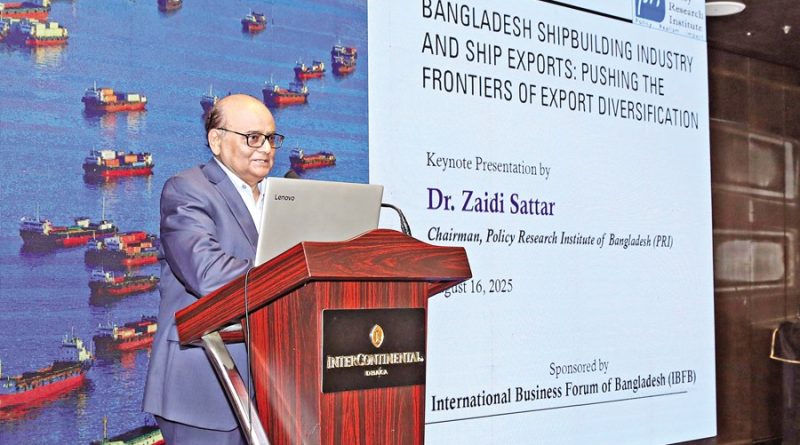Bangladesh’s shipbuilding sector, already earning recognition in the global market, could become a new engine of industrial growth if the country embraces green shipbuilding, industry experts said on Saturday.
They cautioned, however, that the sector faces structural challenges, including lack of long-term financing, high production costs, and policy biases favouring other industries.
The observations came at a seminar on “Green Shipbuilding: A New Frontier for Industrialisation”, organised by the International Business Forum of Bangladesh (IBFB) in Dhaka.
Global demand shifting
Industries Adviser Adilur Rahman Khan, the chief guest, said Bangladesh has demonstrated its capability to meet international standards in shipbuilding.
“The world no longer wants only ships; it wants green ships,” he said, urging coordinated action among stakeholders.
He noted that the International Maritime Organization (IMO) aims to cut carbon emissions by 40 per cent by 2030 and 70 per cent by 2050, a shift that is rapidly boosting global demand for fuel-efficient, eco-friendly vessels.
“If Bangladesh takes this chance, we can become a global hub for sustainable shipbuilding,” he said, adding that the industries ministry would pursue expanded facilities and international partnerships.
Sector revival and potential
Presenting the keynote, Zaidi Sattar, chairman of the Policy Research Institute (PRI), said Bangladesh’s shipbuilding industry showed signs of revival in 2024, with companies such as Western Marine securing new export orders.
Bangladesh has earned $43 million from ship exports over the past 12 years, but with targeted support, each export-oriented shipyard could generate up to $100 million within two years, potentially doubling sector employment to 100,000, he said.
Mr Sattar cited strong global prospects, with the shipbuilding market worth $155 billion in 2024 and projected to reach $193 billion by 2030. Demand drivers include naval modernisation, rising trade, energy-efficient vessels, and green technology adoption, he added.
Need for policy reform
Special guest Anisuzzaman Chowdhury, special assistant to the chief adviser on financial affairs, warned that policy capture had left Bangladesh overly reliant on readymade garments, which account for 85–88 per cent of exports.
“Shipbuilding can become a critical labour-intensive industry but requires institutional support such as insurance and counter-refund guarantees to reduce uncertainty,” he said.
He underscored the importance of government–business dialogue to address risks, while stressing reforms to cut bureaucratic delays, reduce foreign aid dependence, and prioritise strategic industries such as shipbuilding, ICT, and pharmaceuticals.
Citing South Korea’s transformation from poverty to an industrial power, Mr Anisuzzaman said Bangladesh needed “strategic policy independence”. He also highlighted cyber security as a new frontier, warning: “If your data is not secured properly, you are done. Bangladesh must develop local solutions.”
IBFB call
IBFB President Lutfunnisa Saudia Khan delivered the welcome address, while Director Engr Md Sakhawat Hossain and immediate past president Humayun Rashid also spoke at the event.






